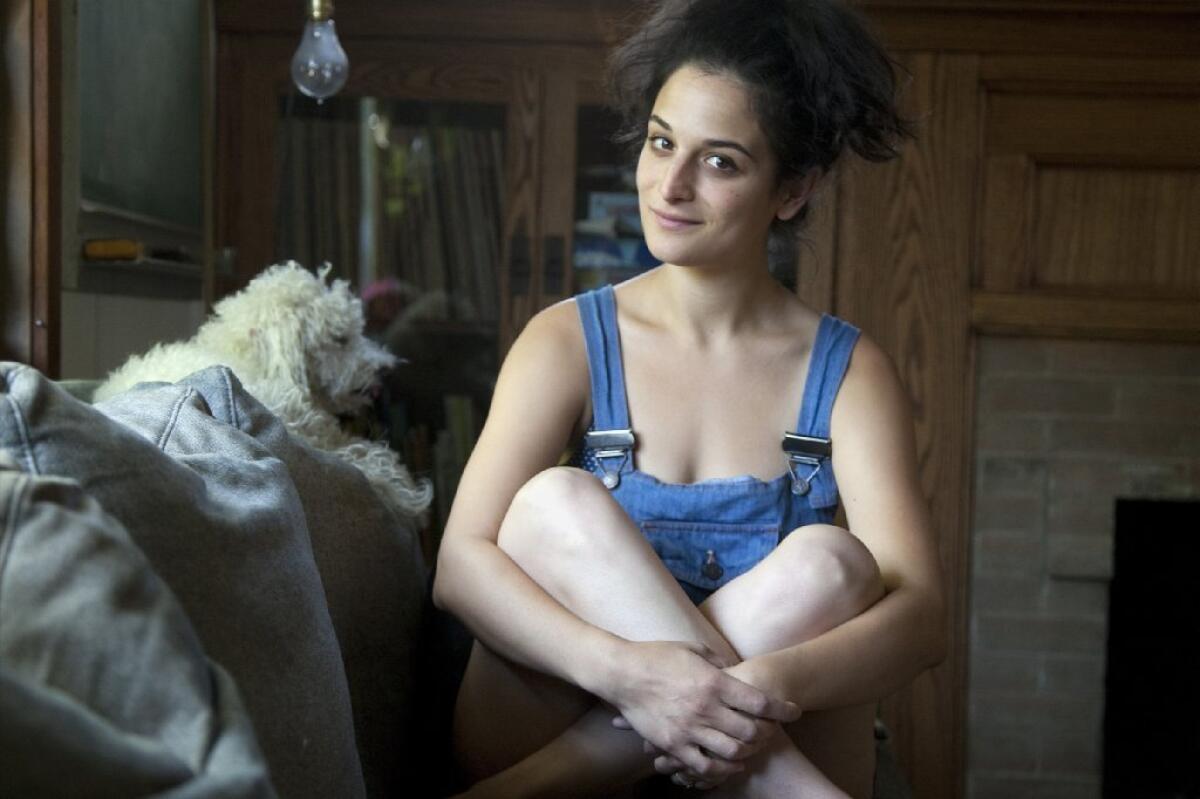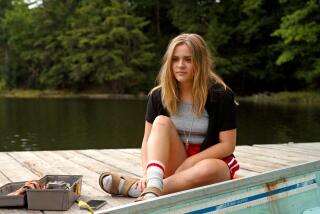‘Obvious Child’s’ Jenny Slate ready to be in the lead

- Share via
“I’m definitely wearing a bikini top as a shirt,” Jenny Slate said, looking down at her body as if she were observing it for the first time that day.
She was. Overalls shorts too. She’d spent the night before drinking at the Sportsmen’s Lodge, celebrating the completion of the first season of a new television show she’s on, FX’s “Married.” Now it was Saturday and sunny, and she was sitting in her garden picking pieces of grapefruit out of a bowl with her fingers. Her hair was in a pile on her head.
“It’s cool,” she said, pulling at her outfit. “I love showing off my boobs. I didn’t get my period until I was 17. I waited my whole life to be a woman, so now my clothes are fairly tight. I like to wear high-waisted jeans, because I like how they make my butt look like a heart.”
Slate, 32, is pretty OK with sharing stuff about her body. It’s basically what she does on her Twitter feed (@jennyslate), which is littered with pictures of her chewed-up fingernails and discussion of her intestinal tract. (“Oh, it’s all true,” she said. “My husband has asked me to stop telling him what my poops look like.”)
It was that candor that made her perfect for “Obvious Child,” her new movie, which had a strong art house debut over the weekend with a $27,000-per-screen average. In the film, one of the breakout hits at the Sundance Film Festival this year, Slate plays Donna, a twentysomething stand-up comedian struggling to make ends meet in Brooklyn. After drunkenly going home with a cute guy, she ends up pregnant and decides to have an abortion.
Directed by newcomer Gillian Robespierre, the movie has earned positive reviews for its approach to the abortion rights debate. Critics have been impressed with Slate in her first picture as a lead. Over the last few years, she has had memorable — usually comedic — turns on TV programs, including “The Kroll Show,” “Parks and Recreation” and “House of Lies.” Still, she has struggled to emerge from the shadow of her ill-fated turn on “Saturday Night Live,” from which she was fired after one season in 2010.
Yes, she’s the woman who infamously dropped an F-bomb during her first episode. The gaffe got a lot of media attention, and Slate said she spent the rest of the season “operating out of fear,” working crazy hours and missing her now-husband, Dean Fleischer-Camp.
“I felt a little bit like I was locked up in a tower,” she said, glancing at her dog, Arthur, sunbathing outside her Los Feliz home. “But I don’t care that I swore. No one will ever convince me that what I did was wrong or hurtful — especially when there are shows like ‘Two and a Half Men’ on TV that are just, like, sexist.”
She read on the website Deadline Hollywood that she had been fired, and then she called her agent to confirm. She said she never heard from “SNL” creator Lorne Michaels.
It was a hard moment for Slate, acknowledged her best friend, Gabe Liedman, who’s also in “Obvious Child.”
“It was sad to see her feelings get hurt and for her to get embarrassed,” said Liedman, who met Slate in an improv group at Columbia University. “No one wants to [screw] up. She was a straight-A student at school. As wild as she seems, she does not [screw] up.”
Slate admitted that she was worried about the impact her “SNL” dismissal would have on her career.
“What sucked about it,” she said, “was that it was like, ‘I’m a young woman, and I just started. And now I have to be the girl that did that?’”
Eager to move on, she dove into work. She and Fleischer-Camp created “Marcel the Shell With Shoes On,” a stop-motion animated short. Slate gives voice to a nerdy, nervous snail-like creature in the film, which has since spawned a bestselling children’s book. She also agreed to star in a feature-length version of “Obvious Child,” a project that began as a short movie.
Robespierre stumbled upon Slate at Rififi, a now-defunct East Village comedy club where Aziz Ansari, Nick Kroll and John Mulaney also started out. The filmmaker watched Slate do a set, telling stories “that combined real bawdiness with a kind of gentleness,” Robespierre recalled.
Slate, as it turned out, was looking to tackle a more meaty part. Growing up, she was transfixed by Judy Garland and Dianne Wiest and Gilda Radner and imagined she might act like them one day. Her parents are artists — father a poet, mother a painter — and they supported Slate financially after college while she was trying to make it.
“At one point,” Slate said, “I remember being really down on myself. I called my dad and said, ‘I’m living off of you, and I have an Ivy League degree. I’m a baby sitter.’ And he was like, ‘Mom and I are making an investment in you, and I don’t want to hear about this again.’”
The gamble, of course, seems to have paid off. Another of Slate’s early champions, Kroll — who continually hires her to appear on his Comedy Central show — is excited about the visibility that “Obvious Child” will give her.
“I think people know she’s happy to tell you that she had diarrhea this morning, but she’s an open soul in her work too,” Kroll said. “That kind of emotional honesty — where you’re willing to expose your true happiness or sadness even if it’s embarrassing — is unbelievably rare.”
Slate is proud of her performance in “Obvious Child,” but working on the movie has made her think beyond her acting career. Participating in discussions about the film, she said, has changed her approach to activism; though she’s long been in favor of abortion rights, she always felt unsure of what to do with her beliefs.
“I just made sure that I was good to women — but suddenly that became not enough for me,” she said. “This movie is trying to show that choosing not to have a baby at 27 is just not a giant shock. She’s a woman having a safe procedure, and even though she wants it, it’s still complicated. It doesn’t have to be a tragedy or a victory — it’s way more colorful and beautiful than that.”
More to Read
Only good movies
Get the Indie Focus newsletter, Mark Olsen's weekly guide to the world of cinema.
You may occasionally receive promotional content from the Los Angeles Times.











